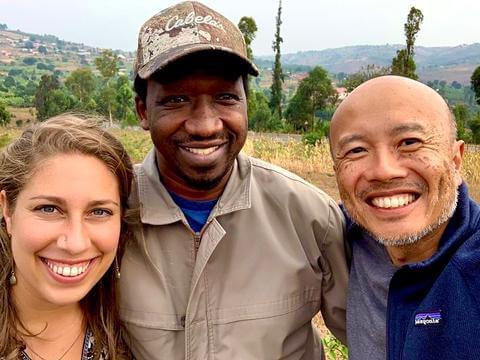USIP Peace Scholar Fellowship Awarded to Clinical Psychology Student

Written by Clinical Psychology PhD Student, Christine Kindler
Photo: Christine Kindler, founder of CARSA - Christophe Mbonyingabo, Dr. Ezer Kang
I am honored to be conducting my dissertation based on a collaborative project with a grassroots organization in Rwanda, the Christian Action for Reconciliation and Social Assistance (CARSA). Peace Conversation Circles (PCC) is a new program that builds on a nine-year partnership between CARSA and the Global Community Health Lab, led by Dr. Ezer Kang in the Psychology Department at Howard University. Using a participatory action research (PAR) approach, PCC aims to promote intergenerational dialogue between older adults who directly experienced the 1994 genocide against the Tutsi (i.e., survivors, perpetrators, rescuers) and Rwandan youth. These conversation circles foster local conversations about the genocide, which are often avoided or minimized, despite the emergence of national programming that promotes peace and reconciliation.
Data collected from this study will be used to conduct an outcome- and process-based evaluation. This will help us not only understand the impact of PCC as an intervention for specific outcomes for participants (e.g., shared local understanding of genocide, willingness and comfort to discuss the genocide intergenerationally, perceptions of outgroup members), but also provide insight into the process of implementing PAR between a U.S.-based university and local non-governmental organization in Rwanda. Rwandan interviewers will ask CARSA-trained community leaders, who assist with the dialogue sessions, questions regarding team membership, voice and equitable involvement in the project, and any personal and community benefits they received as a result of participating in PCC. This deepens our understanding of adapting and applying PAR methods with a specific type of community partner (i.e., well-established grassroots organization), in a particular context (i.e., post-genocide Rwanda). Lessons learned from this process will help to inform future interventions in similar contexts that wish to utilize a PAR approach.
In August 2022, Dr. Kang and I had the opportunity to travel to Rwanda and observe PCC in Muhanga – one of the four sectors in which the project is being implemented. There we had the privilege to listen to multiple dialogue sessions between older adults who directly experienced the genocide and youth from the same sector. This visit was filled with thoughtful conversations with CARSA staff and local community members regarding their experience of the project, as well as ways in which they had adapted or changed aspects of the project to better meet the needs of participants. This provided the chance for us to continue engaging in various aspects of PAR, including relationship-building and centering knowledge generated by the community being studied.
I am so appreciative of all of the generous support I have received to conduct this project, both from the HU Department of Psychology and Graduate School, from which I received the Just-Julian Graduate Research Assistantship. My dissertation is also funded by the Peace Scholar Fellowship from the United States Institute of Peace. Most of all, I am grateful for the support of my academic advisor, Dr. Ezer Kang, the staff at CARSA for coordinating the study and conducting the interviews with exceptional sensitivity, and for all of the participants for being willing to entrust us with their stories. As I continue to develop as a scientist-practitioner, I hope to continue engaging in peace research that utilizes a PAR approach. I am extremely interested in how researchers can ensure that they are preserving the core principles of PAR (e.g., centering the voice and expertise of the community partner, engaging in projects that directly benefit the community being studied), while at the same time adapting the process to fit the community partner’s capacity, as well as the goals and aims of the project.
See more on Dr.Ezer Kang's Website: Global Community Health Lab
